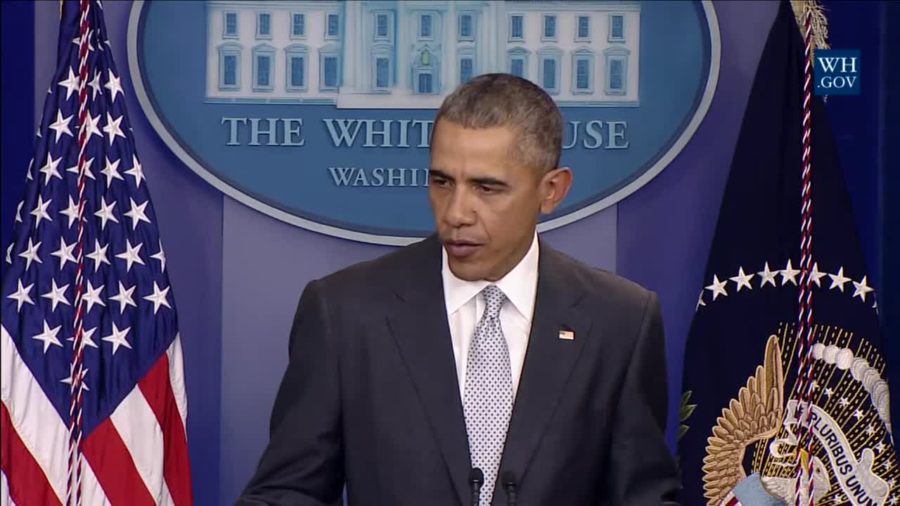Editorial: United States must respond to ISIS attacks
President Obama delivers a statement on the Nov. 13 terrorist attacks in Paris, France. Nice, France was attacked on Thursday, after a man drove through a crowd, killing 84 people.
November 16, 2015
When Paris was attacked by terrorists Friday evening, France was faced with a daunting task — deciding how to respond to ISIS. All the while, the United States had to decide how it would help its oldest ally in its time of need and to what degree its military would be involved in the fight against ISIS.
On Friday night, Paris experienced simultaneous terrorist attacks, both bombings and mass shootings, all claimed by ISIS. The terrorist group killed at least 129 people and wounded hundreds of others, most occurring as four men shot AK-47s at the American rock band Eagles of Death Metal’s concert in the Bataclan, which is one of the city’s most popular music venues.
President Obama said in a statement late Friday night that “We stand prepared and ready to provide whatever assistance that the government and the people of France need to respond.” He went on to say, “We’re going to do whatever it takes to work with the French people and with nations around the world to bring these terrorists to justice, and to go after any terrorist networks that go after our people.”
While Obama’s statement came before officials were absolutely sure that ISIS was the terrorist organization behind the Paris attacks, he did promise that our country would stand with our ally. However, to what degree should the United States respond to this? While it may seem reassuring to the American people and maybe even French people and others targeted by ISIS, is declaring war or taking invasive military action like deploying thousands of troops on the ground in Syria — part of ISIS’ stronghold — the best way to put an end to this terrorist group?
The United States and France are just two countries that were already participating in airstrikes against ISIS. In response to the attacks Friday, France launched another strike against Syria Sunday. The French president, François Hollande, said the country would be “merciless” in responding to this “act of war” and would no longer be concerned about respecting a border between Iraq and Syria, according to a New York Times article.
Additionally, on Monday ISIS released a video saying that those countries participating in the airstrikes will suffer in similar ways to France, even saying the group will attack Washington D.C., according to an article by Reuters.
As an immediate response, the U.S. military and intelligence teams gave France information to help the country identify ISIS targets to bomb in Syria, according to The New York Times article. The article went on to explain that any future long-term moves in the fight against ISIS are not immediately clear for the United States. However, a security adviser, Benjamin J. Rhodes, said that more U.S. troops on the ground in the Middle East is simply not the answer, according to the article.
The article said the president “is looking to do more of what he has already been doing and to do it better.” The possibilities, they said, include more air strikes, Special Operations raids, assistance to local allies and attacks against Islamic State targets outside Syria and Iraq.
Put simply, the United States has spent enough time in war in recent years. While it may feel reassuring to go to war for the time being, a reactionary approach to the terrorist attacks such as simply going to war is not the answer to the problem of ISIS.
Fighting a terrorist organization, whose goal is not to simply take land but rather to spread fear, is more complicated than traditional warfare. Putting combat troops in ISIS’ strongholds doesn’t seem to be the most logical way to prevent the spread of fear and random terrorist attacks. Taking a more strategic approach, like the airstrikes might be a more reasonable approach, at least for now, to taking on ISIS.







